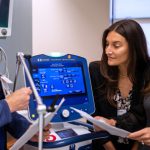 The University of Pittsburgh School of Medicine and Children’s Hospital of Pittsburgh of UPMC have announced a research partnership to develop a software analytics tool that will enable early prediction of catastrophic events such as cardiac arrest or emergency endotracheal tube intubation in patients with congenital heart disease.
The University of Pittsburgh School of Medicine and Children’s Hospital of Pittsburgh of UPMC have announced a research partnership to develop a software analytics tool that will enable early prediction of catastrophic events such as cardiac arrest or emergency endotracheal tube intubation in patients with congenital heart disease.
Children with congenital heart disease account for more than 80 percent of the Cardiac Intensive Care Unit (CICU) population, and cardiac failure is one of three leading causes of morbidity and mortality. Current warning systems in ICUs do not account for all available patient data such as environmental factors and cannot discriminate risk according to the different cardiovascular physiology in congenital heart disease patients.
The new tool, called the Cardiac ICU Warning Index (C-WIN), will allow physicians an early detection of potentially catastrophic events allowing for timely intervention, with a potential decrease in morbidity, mortality and hospital length of stay.
Dr. Fuchiang (Rich) Tsui, associate professor of biomedical informatics at Pitt’s School of Medicine, and his team will collaborate with clinical domain experts to create predictive models and tools based on analysis of multi-year clinical data obtained from inpatient electronic health records (EHR) at Children’s Hospital. The resulting C-WIN solution will provide cardiac critical care physicians and pediatric intensive care unit staff with a real-time mortality warning index integrated in the EHR at Children’s.
Dr. Ricardo Muñoz, chief of the Cardiac Intensive Care Division at Children’s and professor of critical care medicine, pediatrics and surgery at Pitt’s School of Medicine, will lead the team of pilot users for C-WIN implementation.
“Potentially catastrophic events such as cardiac arrest are difficult to predict in patients with congenital heart disease, and current monitoring devices capture only a small amount of real-time data,” said Dr. Donald Taylor, assistant vice chancellor of Commercial Translation at Pitt Health Sciences and associate professor in Pitt’s departments of Biomedical Informatics and Bioengineering.
“Traditional warning systems used in general adult and pediatric populations do not account for significant differences in cardiovascular physiology in patients with congenital heart disease,” said Dr. Alejandro Lopez, assistant professor of telemedicine/e-CICU at Pitt who will collaborate as clinical co-investigator. “C-WIN will provide us with a very potent and specific tool to improve survival and quality of life for this very special children.”
Other challenges facing the care of these patients includes a lack of standards of data to guide care, a shortage of intensivists and the alarm fatigue often experienced by staff in an intensive care unit environment, Muñoz added.
Due to the unique features of C-WIN and product deployment at the cardiac intensive care unit at Children’s, it can be further extended to international patients through the e-CICU program, which offers remote consultation of critical care units by Children’s world-class pediatric intensivists and cardiologists when complex critical care expertise is required.
The project is funded by Children’s Hospital.








